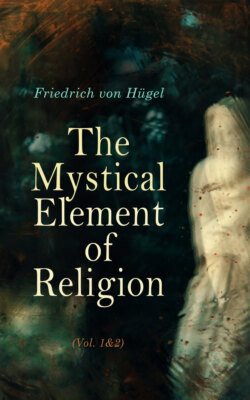Читать книгу The Mystical Element of Religion (Vol. 1&2) - Friedrich von Hügel - Страница 18
На сайте Литреса книга снята с продажи.
1. The antinomy in the pre-Socratics.
ОглавлениеHeraclitus appeared to us an impressive exponent of the former truth, of the apparent utter evanescence of these particular impressions and experiences, of the complete shiftingness of the very faculty within us and of the environment without us, by which and in which we apprehend them. An ever-changing self in the midst of an ever-changing world, basing its persuasiveness and persuadableness, indeed even its conscious identity with itself and its communion with others, upon the ever-changing resultants of all these changes: this would surely seem to be a house built not upon the sand but upon the quicksands.
Now we have to remember that Parmenides had, already in early Greek times, been equally emphatic, perhaps equally impressive, on the other side of this very question,—on the impossibility of Becoming, of Change; and on the certainty and knowableness of the utter Oneness and Permanence of all Being.[1] All that really is, he maintained, excludes all Becoming: the very notion of Being is incompatible with that of Becoming: the first is utterly without the second. All real Becoming would be equivalent to the real existence of Non-Being. Hence all Multiplicity and Becoming is necessarily but apparent, and masks an underlying absolute Unity and Permanence, which can be reached by the intellect alone. And this position of Parmenides was felt to be so strong, that all the subsequent Greek Physicists took their stand upon it: the four unchangeable elements of Empedocles, the Atoms of Leucippus and Democritus (atoms of eternally unchanging shape and size, and of one absolutely uniform and unchanging quality) are but modifications of the doctrine of Parmenides concerning the Oneness and Unchangeableness of Being.
But even Heraclitus himself is far removed from denying all Oneness, all Permanence. For, according to him, a permanent law of permutation runs through and expresses itself in the shiftingness of all things perceptible by sense; or rather one eternal physical substance, Fire, of ceaselessly active properties, is continually manifesting itself, in a regular succession of appearances, from fire to air, from air to water, from water to earth, and then backwards up again to fire.
And when once the Greeks begin to break away from all this Hylozoism,—these systems which uniformly, from Thales to Democritus, attempt to explain all things by some one living or moving Matter, without the intervention of Spirit or of Mind,—Spirit appears in Anaxagoras as the One, and as present, everywhere and in varying degrees, as the principle of the motion of that co-eternal matter which is here, on the contrary, conceived of as but apparently homogeneous anywhere, and as really composed of an indefinite number and combination of qualitatively differing constituents.
Thus in all its schools, even before Socrates and Plato, Greek philosophy clung to the One and the One’s reality, however differently it conceived the nature of this Unity, and however much it may have varied as to the nature and reality of the Many, or as to the relation and the bond subsisting between that Unity and this Multiplicity. Only at the end of this first period do the Sophists introduce, during a short time marked by all the symptoms of transition, uncertainty, and revolution, the doctrine, of the unknowableness, indeed of the unreality, of the One, and with it of the exclusive reality of mere Multiplicity, of evanescent Appearances.
